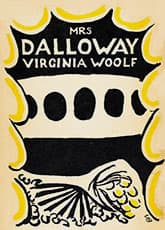Mrs Dalloway
Critique • Quotes • At the movies
 First edition
First editionFirst publication
1925
Literature form
Novel
Genres
Literary
Writing language
English
Author's country
England
Length
Approx. 72,000
Adrift in the disembodied life
Partway though a rereading of Mrs Dalloway a sudden idea threatened to upset everything I had ever thought about the author. Was it possible Virginia Woolf was really making fun of her insufferably effete lead characters?
It would explain how she could reel off page after page of the interior lives of Clarissa Dalloway and her circle of upper-crust friends, scarcely expressing earthly passions or physical being of any kind. (An earlier edition of this article was titled "Do these people ever have sex?")
That their stultifying existences are being satirized would explain why so much is made of the slightest of emotional contacts, why fleeting incidents of interpersonal intercourse are rhapsodized over. A kiss decades ago is remembered as a practically religious experience, presumably never since repeated.
It might also explain the periodic appearances of the lower-class Warren Smiths. The abrupt injections of this unrelated couple into the story are awkward, but they make sense if Woolf is using them as foils. These people with real problems arising from the recent devastating world war, which seems not to have affected the work's central characters in the least, would be there to show up the superficiality of the Dalloway crowd.
This would make Mrs Dalloway more interesting.
Alas, further reading fails to support this interpretation. If Woolf is satirizing her class, it's with a supremely dry wit, sustained throughout the the novel. She really is depicting their precious internal monologues as serious matters.
Romantic interests
The plot of Mrs Dalloway is simple. We follow various characters through a single day leading to a party to be given by Clarissa Dalloway, wife of a parliamentarian, that evening. Clarissa's thoughts range equally over the past and present, especially recalling two former romantic interests of her youth—one male and one female—who are expected to show up at the party tonight.
In particular, she dwells on Peter Walsh, an exciting but unreliable suitor she rejected in favour of the dull but reliable man she married. She ponders whether that decision was a mistake. This recalls the situation of the heroine in James Joyce's story "The Dead", married to a good man but recalling the lost passionate lover. But after weighing up her past options, Clarissa seems to accept her lot placidly, losing herself in organizing parties.
The narrative, such as it is, famously takes place almost entirely in the minds of its characters. Mrs Dalloway was supposedly written in response to Joyce's stream-of-consciousness epic, Ulysses, which Woolf is reputed to have considered too crude. I'm reluctant to refer to the mode of writing in Mrs Dalloway as stream of consciousness, as it is usually called, though. Woolf's characters are all so literate, even in their heads. Thinking is almost always in complete sentences with proper grammar. Even an obviously mad character has well-rounded thoughts. Shouldn't a genuine rendering of consciousness be more fragmented, more chaotic, bordering on incoherence (à la Joyce at his wildest)?
A better term for Woolf's narrative mode may be impressionist, as Woolf gives the impression of what concerns each of these characters, filtered through her own manner of speech. Woolf's genius is her infinite sensitivity to every nuance of her character's chosen experiences and her ability to encapsulate these in concise, everyday language. Quite often while reading Mrs Dalloway, one finds oneself saying, "That's just what it feels like", about some passing sensation or thought.
Out of body experiences
However, one seldom feels her characters are flesh and blood creations. Love, fear, jealousy any briefly experienced bodily emotions are processed and made incorporeal.
Bluntly, her characters are such prigs. And, worse, boring. Their upper-class foibles are all so inconsequential.
An exception is the case of the aforementioned Septimus Warren Smith, a traumatized soldier who sees and hears a comrade killed in the war, and Lucrezia, his bewildered but loving wife. These characters have little to do with the intellectual folk who populate most of Woolf's world, other than passing them in the street. Yet this tangential subplot provides the most gripping passages of the novel—true matters of life and death.
When Clarissa finds out about the disturbed young man's suicide, she appropriates it as a warning for her:
Somehow it was her disaster—her disgrace. It was her punishment to see sink and disappear here a man, there a woman, in this profound darkness, and she forced to stand here in her evening dress. She had schemed; she had pilfered. She was never wholly admirable. She had wanted success.
But she quickly comes to terms with it, as if the previously unknown Septimus and she are similar:
She felt somehow very like him—the young man who had killed himself. She felt glad that he had done it; thrown it away. The clock was striking. The leaden circles dissolved in the air. He made her feel the beauty; made her feel the fun.
Again, this is close to being a satire on her narcissistic life. Self-critical at least. Though I'm not sure Woolf sees it that way.
— Eric
Critique • Quotes • At the movies

